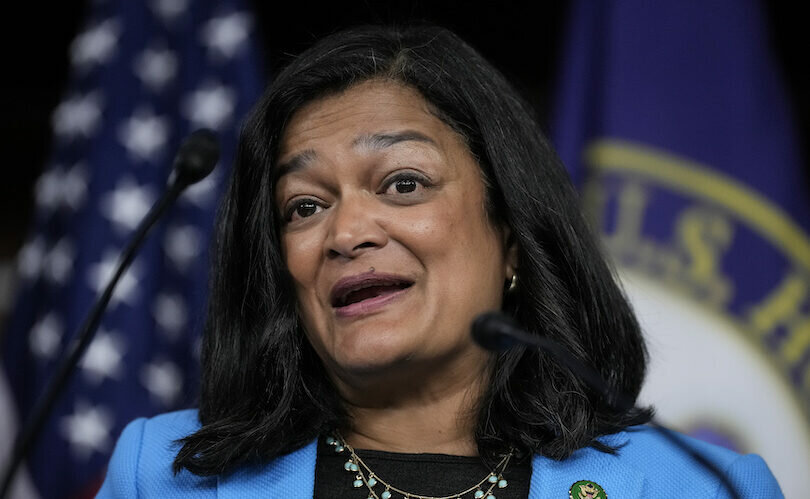WASHINGTON, D.C. (LifeSiteNews) — Payton McNabb, a former North Carolina high school volleyball player still dealing with the medical fallout from being injured by a male player more than a year ago, fired back recently at a claim by U.S. Rep. Pramila Jayapal (D-WA) that “not a single” gender-confused American was harming anyone else.
Fox News reports that, during comments about legislation banning men in women’s sports and requiring federally-funded universities to recognize student groups, Jayapal opined that “it is a tiny portion of people across the country that identify as trans, and not a single one of them is doing anything to harm you or your family. Stop it, we have better things to do in Congress.”
In response, U.S. Rep. Greg Steube (R-FL) suggested that McNabb would disagree, to which McNabb tweeted that she was “Just getting back from my second doctor appointment this week, a year and a half later, I’m definitely going to have to disagree. My life is forever changed because of an injury by a boy. So yeah… men have harmed women in our sports. But as long as your feelings don’t get hurt, right?”
Just getting back from my second doctor appointment this week, a year and a half later, I’m definitely going to have to disagree. My life is forever changed because of an injury by a boy.
So yeah… men have harmed women in our sports. But as long as your feelings don’t get… https://t.co/nhDMlEXprg
— payton mcnabb (@paytonmcnabb_) March 21, 2024
According to Independent Women’s Forum, McNabb was a 17-year-old junior on September 1, 2022, when she “received a devastating head and neck injury” when she received a spike to the face by a male opponent who “identified” as female, which left her unconscious for more than 30 seconds, despite her and her teammates struggling to play defensively for the whole game due to the male opponent’s participation. The ordeal left her with a concussion, vision problems, partial paralysis, and “blank spaces” in her memory over the following year.
“My coach’s wife kept trying to push my arms and legs down, but they kept coming back up. She had no idea what was happening,” while “the boy who hit me and the girls on his team were standing on the other side of the net laughing at me,” McNabb said. Her testimony was later credited with helping pass North Carolina’s Fairness in Women’s Sports Act.
Watch the clip of Payton McNabb getting spiked in the face by a male competing with the women. Then watch her testimony she gave today for the first time publicly. I was honored to stand alongside her in NC to continue the fight to protect women's sports. pic.twitter.com/mvJmwprkaX
— Riley Gaines (@Riley_Gaines_) April 20, 2023
The bills before the House committee went on to pass, but despite McNabb’s story and many similar experiences nationwide, “[e]very Democrat on committee voted against it,” Steube added. “Make no mistake: the Democrats don’t care about protecting women – they care more about appeasing the radicals of their party and enabling the erasure of women’s sports.”
Mandatory inclusion of gender-confused individuals in opposite-sex sports is promoted by the left as a matter of “inclusivity,” but critics note that indulging “transgender” athletes undermines the original rational basis for having sex-specific athletics in the first place, thereby depriving female athletes of recognition and professional or academic opportunities, as well as undermining female players’ basic safety and privacy rights by forcing them to share showers and changing areas with members of the opposite sex.
There have been numerous high-profile examples in recent years of men winning women’s competitions, and research affirms that physiology gives males distinct athletic advantages that cannot be negated by hormone suppression.
In a 2019 paper published by the Journal of Medical Ethics, New Zealand researchers found that “healthy young men [do] not lose significant muscle mass (or power) when their circulating testosterone levels were reduced to (below International Olympic Committee guidelines) for 20 weeks,” and “indirect effects of testosterone” on factors such as bone structure, lung volume, and heart size “will not be altered by hormone therapy;” therefore, “the advantage to transwomen [gender-confused men] afforded by the [International Olympic Committee] guidelines is an intolerable unfairness.”
Both aspects of the controversy were highlighted by University of Pennsylvania swimmer William “Lia” Thomas, who reportedly retains male genitalia and is still attracted to women yet “identifies” as female and lesbian. Thomas quickly started dominating women’s swimming after switching from the men’s team, and caused his female teammates unrest due to sharing lockers with them. Yet the National Collegiate Athletic Association (NCAA) has reportedly pressured swimmers and their parents against speaking out.

